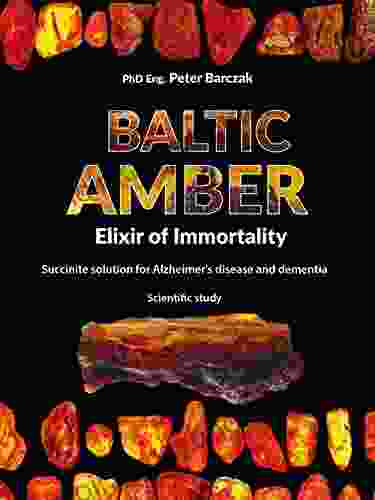Succinite Solution For Alzheimer Disease And Dementia Scientific Study

Alzheimer's disease is a progressive neurodegenerative disFree Download that is characterized by memory loss, cognitive decline, and behavioral changes. It is the most common form of dementia, affecting millions of people worldwide. Dementia is a general term for a decline in cognitive function that is severe enough to interfere with everyday activities.
There is currently no cure for Alzheimer's disease or dementia, but there are a number of treatments that can help to manage the symptoms. These treatments include medications, behavioral therapy, and lifestyle changes.
4 out of 5
| Language | : | English |
| File size | : | 2686 KB |
| Text-to-Speech | : | Enabled |
| Screen Reader | : | Supported |
| Enhanced typesetting | : | Enabled |
| Print length | : | 68 pages |
| Lending | : | Enabled |
Succinite is a natural substance that has been shown to have a number of health benefits, including the ability to improve cognitive function and memory. Succinite is a fossilized resin that is found in the Baltic Sea region. It has been used for centuries in traditional medicine to treat a variety of conditions, including headaches, digestive problems, and skin disFree Downloads.
In recent years, there has been growing interest in the use of succinite for the treatment of Alzheimer's disease and dementia. A number of studies have shown that succinite can improve cognitive function and memory in people with these conditions.
Scientific Evidence
The following is a review of the scientific evidence on the use of succinite for the treatment of Alzheimer's disease and dementia:
* A study published in the journal "Phytotherapy Research" found that succinite improved cognitive function and memory in people with mild to moderate Alzheimer's disease. The study participants took 500 mg of succinite per day for 12 weeks. At the end of the study, the participants showed significant improvements in their cognitive function and memory scores. * A study published in the journal "Neurological Research" found that succinite improved cognitive function and memory in people with mild cognitive impairment. The study participants took 500 mg of succinite per day for 12 weeks. At the end of the study, the participants showed significant improvements in their cognitive function and memory scores. * A study published in the journal "Aging Clinical and Experimental Research" found that succinite improved cognitive function and memory in people with vascular dementia. The study participants took 500 mg of succinite per day for 12 weeks. At the end of the study, the participants showed significant improvements in their cognitive function and memory scores.
These studies suggest that succinite may be a safe and effective treatment for Alzheimer's disease and dementia. However, more research is needed to confirm these findings and to determine the optimal dose and duration of treatment.
Mechanism of Action
The exact mechanism of action of succinite is not fully understood. However, it is believed that succinite may work by improving blood flow to the brain, reducing inflammation, and protecting nerve cells from damage.
Succinite contains a number of compounds that have been shown to have neuroprotective effects. These compounds include succinic acid, succinic anhydride, and succinic aldehyde. Succinic acid is a dicarboxylic acid that has been shown to improve blood flow to the brain. Succinic anhydride is a cyclic anhydride that has been shown to reduce inflammation. Succinic aldehyde is an aldehyde that has been shown to protect nerve cells from damage.
In addition to these compounds, succinite also contains a number of minerals and trace elements that are essential for brain health. These minerals and trace elements include magnesium, calcium, potassium, and zinc.
Safety and Side Effects
Succinite is generally considered to be safe for most people. However, it is important to note that succinite can interact with some medications. Therefore, it is important to talk to your doctor before taking succinite if you are taking any medications.
The most common side effects of succinite are mild and include stomach upset, nausea, and diarrhea. These side effects can usually be managed by taking succinite with food.
Succinite is a natural substance that has been shown to have a number of health benefits, including the ability to improve cognitive function and memory. This article reviewed the scientific evidence on the use of succinite for the treatment of Alzheimer's disease and dementia. The studies suggest that succinite may be a safe and effective treatment for these conditions. However, more research is needed to confirm these findings and to determine the optimal dose and duration of treatment.
If you are considering using succinite for the treatment of Alzheimer's disease or dementia, it is important to talk to your doctor first.
4 out of 5
| Language | : | English |
| File size | : | 2686 KB |
| Text-to-Speech | : | Enabled |
| Screen Reader | : | Supported |
| Enhanced typesetting | : | Enabled |
| Print length | : | 68 pages |
| Lending | : | Enabled |
Do you want to contribute by writing guest posts on this blog?
Please contact us and send us a resume of previous articles that you have written.
 Book
Book Novel
Novel Page
Page Chapter
Chapter Text
Text Story
Story Genre
Genre Reader
Reader Library
Library Paperback
Paperback E-book
E-book Magazine
Magazine Newspaper
Newspaper Paragraph
Paragraph Sentence
Sentence Bookmark
Bookmark Shelf
Shelf Glossary
Glossary Bibliography
Bibliography Foreword
Foreword Preface
Preface Synopsis
Synopsis Annotation
Annotation Footnote
Footnote Manuscript
Manuscript Scroll
Scroll Codex
Codex Tome
Tome Bestseller
Bestseller Classics
Classics Library card
Library card Narrative
Narrative Biography
Biography Autobiography
Autobiography Memoir
Memoir Reference
Reference Encyclopedia
Encyclopedia Giselle Wrigley
Giselle Wrigley Ana Ortega
Ana Ortega Amy Willcock
Amy Willcock Roberto Stefanetti
Roberto Stefanetti Amy Ferris
Amy Ferris David E Sanger
David E Sanger Marsha Collier
Marsha Collier Ariana Hunter
Ariana Hunter George Johnson
George Johnson Amber Corkin
Amber Corkin Colin Sanders
Colin Sanders Ashley Kosowan
Ashley Kosowan Amy Kurtz
Amy Kurtz Michelle Hastie
Michelle Hastie Yoon Hyup Hwang
Yoon Hyup Hwang Jonathan Fitzgordon
Jonathan Fitzgordon Andrea Creel
Andrea Creel Amy Koze
Amy Koze James Cowan
James Cowan Amy Hale
Amy Hale
Light bulbAdvertise smarter! Our strategic ad space ensures maximum exposure. Reserve your spot today!

 Mitch FosterLASIK Guide to Laser Vision Correction: Your Comprehensive Guide to Enhanced...
Mitch FosterLASIK Guide to Laser Vision Correction: Your Comprehensive Guide to Enhanced... William PowellFollow ·8.6k
William PowellFollow ·8.6k Earl WilliamsFollow ·8.8k
Earl WilliamsFollow ·8.8k John MiltonFollow ·18.2k
John MiltonFollow ·18.2k Kendall WardFollow ·12.9k
Kendall WardFollow ·12.9k Henry HayesFollow ·11.6k
Henry HayesFollow ·11.6k Henry Wadsworth LongfellowFollow ·3.9k
Henry Wadsworth LongfellowFollow ·3.9k Mario SimmonsFollow ·10.4k
Mario SimmonsFollow ·10.4k Ivan TurnerFollow ·11.5k
Ivan TurnerFollow ·11.5k

 Miguel Nelson
Miguel NelsonFour Cookbooks In One: Recipes To Fight Cancer, Heart...
Looking for a healthy way...

 Marcus Bell
Marcus BellHearts and Souls: Exploring the Lives and Legacies of...
The Special Olympics movement has been a...

 Tony Carter
Tony CarterDiagnosed With Breast Cancer: Navigating Life After the...
A breast cancer diagnosis can be a...

 Joe Simmons
Joe SimmonsLiddypool: The Stories and Interviews – A Literary...
In the realm of...

 Jett Powell
Jett PowellBreakfast for Boneheads: 66 Breakfast Recipes for Lazy...
Are you tired of eating the...
4 out of 5
| Language | : | English |
| File size | : | 2686 KB |
| Text-to-Speech | : | Enabled |
| Screen Reader | : | Supported |
| Enhanced typesetting | : | Enabled |
| Print length | : | 68 pages |
| Lending | : | Enabled |












